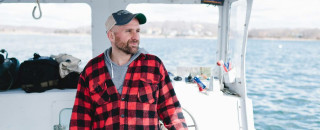Restorative Ocean Farmer Bren Smith
By Riley Black
We often speak of land and sea as they are entirely separate realms. That's part of our bias as landlubbers. But innovator and aquaculture pioneer Bren Smith has a deeper view, envisioning solutions to many of our terrestrial concerns out in the oceans.
Following a career in commercial fishing, Smith changed tacks to do something entirely different. More than a decade ago, Smith founded Thimble Island Ocean Farm - a sustainable ocean farm focused on shellfish and seaweed. But it's not just that. "Our kelp soaks up carbon and nitrogen. The oysters filter out nitrogen," Smith told the Daily Nutmeg last year, in a farm that does not require land, fertilizer, irrigation, or many of the other inputs that terrestrial farms are based around. The idea, Smith notes, is that the farm is regenerative. The process not only puts food on people's tables, but the farms help to restore the habitats where they're planted.
Smith's work in the cod fishing industry helped inspire his innovative career change. When cod fisheries collapsed, he notes, "I was face-to-face with the reality that there would be no jobs on a dead planet." He took what he knew to make a 3D farming program at sea and founded GreenWave, a non-profit to share and teach the new techniques to other farmers around the world.
Part of the effort involves changing the way we think about what we consume and where it comes from. "Instead of being like, oh, what do we want to eat," Smith told PBS Newshour, "it needs to shift to, what can we grow? What can the Earth provide at this moment?"
That's not to say that the task is easy. Smith and other ocean farmers can't go out and survey their crops every morning because what's growing is submerged until it's time to harvest. Nevertheless, by choosing carefully, 3D farming can both provide sustainable food for people while rejuvenating the waters where the farms reside. "You're just allowing your shellfish and seaweed to soak up what's in the water, soak up carbon, sunlight, things like that, in order to grow, which makes it zero-input food," he says, "making it hands down the most sustainable form of food production on the planet."
This new way of farming, Smith says, can provide food, jobs, and healthier ecosystems - even going a way to help mitigate human-caused climate change. It's something that's not restricted to shore communities, but can reach far into communities across the world. It's a big task, but, Smith says, knowing that these local efforts can have huge impacts helps to drive him forward. "It’s like, oh, I can be part of the piece of the puzzle of addressing the biggest crisis we have ever faced as humanity."
Bren Smith was a speaker in the 2022 Lecture Series. Click here to learn more about our upcoming Lecture Series here. Or, click here to read more about the 2022 Lecture Series.
Riley Black is the author of The Last Days of the Dinosaurs, Skeleton Keys, My Beloved Brontosaurus, and is a science writer for the Natural History Museum of Utah, a part of the University of Utah in Salt Lake City. Our mission is to illiminate the natural world and the place of humans within it. In addition to housing outstanding exhibits for the public, NHMU is a research museum. Learn more.
